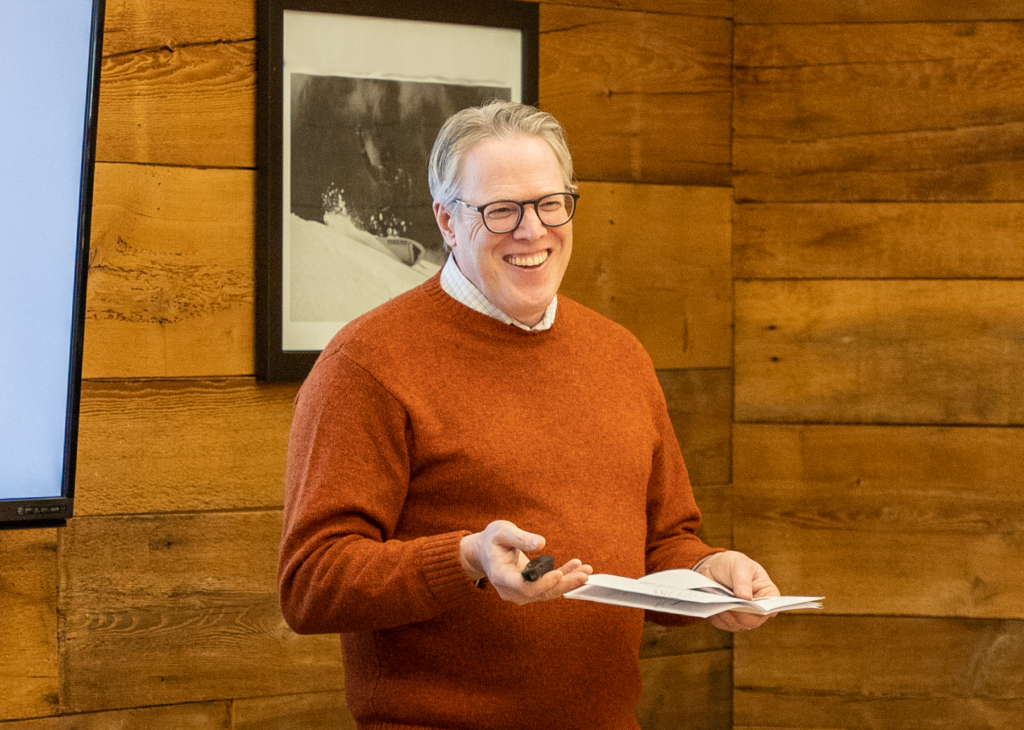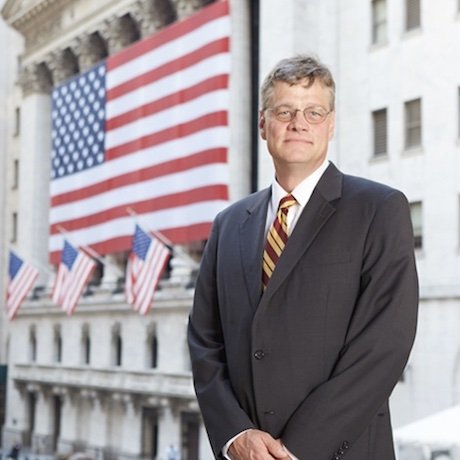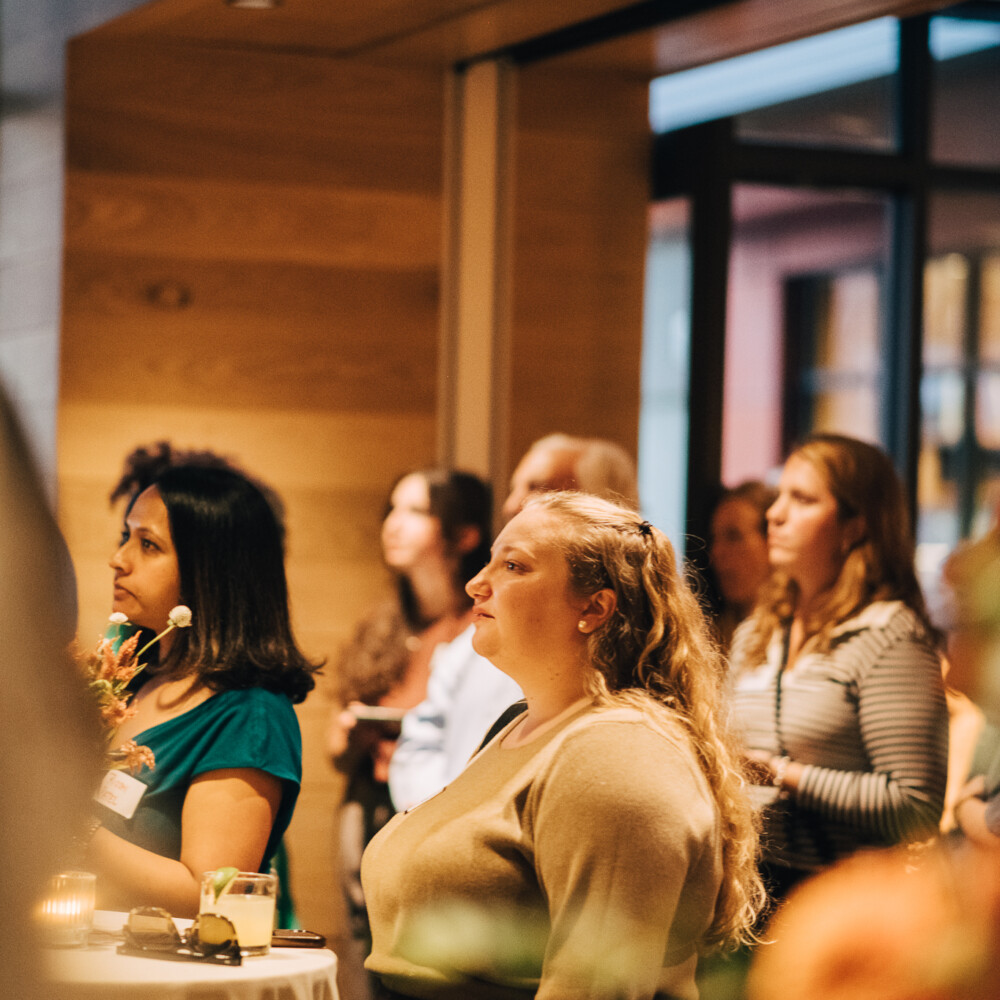
Peter Anderson / Executive Coach
Coaches @ VCET Series
Peter Anderson is an executive coach in Burlington, Vermont. Prior to coaching, he taught in academia for two decades and worked for the International Baccalaureate program. In this Q&A, Peter shares how he got involved in coaching, what sets him apart as a coach, and some misconceptions that people have about the profession. He also shares his favorite things about the VCET community.
Blaise: Peter! You’ve been coaching now for almost five years. Tell me about the career that prepared you for this role.
Peter: I was a professor for 20 years. I taught languages and was part of the teacher preparation program at Grand Valley State in Michigan. I spent a lot of time thinking about how people learn as well as mentoring students and junior colleagues. That translated well into coaching. I also headed the academic side of the classical languages program for the International Baccalaureate (“IB”) program.
Blaise: Sounds like a full plate! Why did you decide to make the career shift? You founded your own practice, Inner Citadel Consulting, in 2020.
Peter: I burnt out. I had administrative roles, teaching roles, research, and I was traveling about eight times a year over to The Hague and Cardiff. I just reached the end. When I realized what was happening, it coincided with a move back east to Potsdam, New York, much closer to family. I realized my training and interest in Stoicism was all connected to the idea of emotional intelligence and leadership development. So I did a bunch of coursework and training with the International Coaching Federation. I built my business in New York for a few years and then we moved back to Burlington. I’m a solopreneur. I do about half consulting and half coaching. In the consulting space, I’m training people with formal programs, helping them figure out how their leadership teams can make better decisions.
Blaise: How would you describe your coaching methodology?
Peter: I help leaders and their teams have the conversations that they can’t manage on their own. As a coach, that usually means conversations that people aren’t having with themselves. I help them through being curious and non-judgmental. The International Coaching Federation also has a set of professional and ethical guidelines that all certified coaches follow. The most important guideline is that coaches ask questions that follow what the client is talking about. Coaches never impose things onto clients. I use techniques like emotional intelligence, mindfulness, and Stoicism to get to the right question.
Blaise: What type of clients do you work for?
Peter: I tend to engage with knowledge-industry clients. They are people with a really high level of technical training in something –– engineering, computer, software, higher ed, nonprofits –– but not much training in people. One challenge they face is leading authentically. We know that, for managers who are effective coaches, their people are something like 70% happier. It’s really significant. The second is related to cognitive and social-emotional resources. For instance, you wake up, haven’t slept well the night before, and have five stressful meetings. That day has the high potential to suck. How as a leader do you manage that? And then the third thing is career and leadership trajectory.
Blaise: How do you find clients?
Peter: Being in front of people is the single best advertiser. I am my brand. The other way clients find me is through blogs and people sharing stuff. I’m not looking to be huge. I can’t scale. VCET has been great for me – I don’t actually want to coach anyone formally at VCET. But once a group scales and moves away, I’d be happy to engage, because then they’ve got a team that needs to be thinking about how to organize a culture. I work across the country. I’ve recently worked with a team in Vancouver, Canada; I’ll be in LA next month working with a team; and then I’m down in Austin, TX in November. But I’m trying to be more local, because I don’t want to travel that much. I think I have a lot of value to give to the Northeast.
Blaise: What makes you unique as a coach? What’s your secret sauce?
Peter: There are two things. One, my clients experience me as genuinely empathetic and authentic. I’m connecting with them without putting on my agenda. My clients also tell me that I am really good at asking the right question at exactly the right time. That comes from listening empathetically. I know a coaching session or a training session has gone well when someone pauses and says, ‘Damn, that’s a good question,’ and then has to stop to think. That’s what I’m after.
Blaise: What are your long-term goals?
Peter: I will be focusing on organizational mindfulness because it is a way of thinking about work that connects productivity, mental health, and employee wellness. This is the critical challenge all organizations face right now, whether it’s mental health, retention, engagement, or culture alignment. I always say “emotional intelligence and organizational mindfulness aren’t a magic pill, but they’re a hell of a multivitamin.”
Blaise: What is your favorite thing about coaching?
Peter: First, I get to meet some really amazing people. Most people who come for coaching are highly accomplished people who just need help seeing a problem from a different angle. It is totally energizing to meet such cool people. The other is actually the variety – I love it. If I were at a desk, doing the same thing every day, I would wither. My days are totally cool.
Blaise: What are some common misconceptions about coaching?
Peter: There are two and they’re really bad. The first is that coaching is akin to therapy, which it’s not. Therapists diagnose and treat mental health concerns. Coaches do not. The second is that coaches tell you how to solve your problems. That’s when you hire a consultant. Coaching is not giving advice. I’m cautious about the ethics of advice, because I bear no consequence for any advice I give you. Coaching is about helping you figure out what’s best for you. I always say, “If you know what you don’t know, hire a consultant. If you’re not sure what you don’t know, hire a coach.”
Blaise: What’s the coaching community like?
Peter: There are big consulting or coaching groups that develop their own community. But for independent people like me, we love talking to each other, because we get it… and each other. Good coaches are really good listeners. None of us tell each other what to do, we just listen. [Stephanie Lowe, Alexa Cole, and I] will call each other up or Slack each other, and say, ‘Hey, do you have half an hour? I just need to get some perspective on something.’

Blaise: When did you join VCET? How did you hear about it?
Peter: I had been coming back to Burlington for 15 years since we have family here. My wife was born in Burlington – her family has lived in Vermont for at least seven generations – so this was the place we wanted to come back to. But when we returned, I didn’t want to work out of my house, which is what I did during the pandemic. I needed to be around people. I needed to connect. VCET is exactly the right size. It’s a place where you can work with people who could become your friends.
Blaise: What’s been one highlight of your time with VCET?
Peter: VCET represents the absolute best of the Vermont entrepreneur community. Just the absolute best. Everybody is generous with their time. They’re generous with their attention and praise. They genuinely believe that each other can make a difference. It is just such a perfect Vermont ecosystem. When people say ‘VCET family’, I mean, we’re not actually a family, but boy it feels that way in a good way.
Blaise: How else do you stay busy, Peter? What do you do in your free time?
Peter: In terms of hobbies, there are probably three. I have a garden plot up at Rock Point North Community Garden, so I spend a lot of time there, fighting weeds and losing most of the time. I play a lot of pickleball; this summer, I’ve not played as much. I also do a lot of tabletop gaming – board games, and role-playing games. And then my new hobby…is building my own teardrop trailer.
Blaise: Is there anything else that I should know for this profile?
Peter: When people talk about the work that I do, it’s important to understand that consulting and coaching run on parallel tracks to each other, but they are really very different things. I’m constantly asking people ‘do you want to talk to consultant Peter? Or do you want to coach Peter?’ That informs the way I approach stuff, like talking to you today or connecting with clients, trying to find out what they need, before I start offering solutions.
This interview has been lightly edited for brevity and clarity.
You can follow Peter on LinkedIn here. For more on his work, click here.



